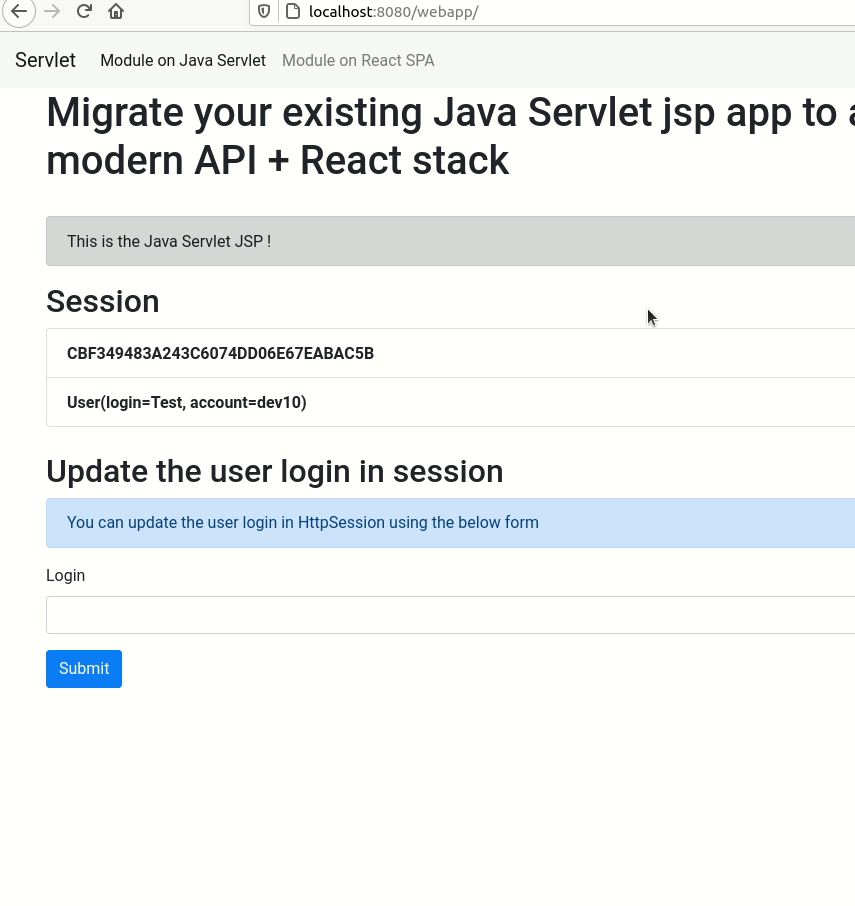Java Web Servlet project with a Jersey API
This Java project is a Java Servlet JSP app including also a running Jersey API on /api/*.
The goal of this demo is to demonstrate how to build such an app and how to use it with a React SPA running alongside the Java Servlet App.
All of that in order to allow you to progressively migrate your historic Java Servlet App to a more modern stack.
Build the Java Servlet App
You can find a more detailed information following this repository: Jersey Injection Dependency example with HK2
The Servlet App
We create an unique Servlet to cover our example: SrvHome
It will be mapped to the root path / in web.xml:
<servlet>
<servlet-name>SrvHome</servlet-name>
<servlet-class>com.SrvHome</servlet-class>
<load-on-startup>1</load-on-startup>
</servlet>
<servlet-mapping>
<servlet-name>SrvHome</servlet-name>
<url-pattern></url-pattern>
</servlet-mapping>In our Servlet we are setting a User in session and we handle a form submit that will update the user login:
public class SrvHome extends HttpServlet {
@Override
protected void doGet(HttpServletRequest request, HttpServletResponse response) throws ServletException, IOException {
User user = (User) request.getSession().getAttribute("user");
// initialize user if not exists in session
if (user == null) {
user = new User("m4nu56", "dev10");
}
// handle form submit to update user login
if (request.getParameter("input-login") != null) {
user.setLogin(request.getParameter("input-login"));
}
// set user in session
request.getSession().setAttribute("user", user);
// forward to the jsp
request.getRequestDispatcher("index.jsp").forward(request, response);
}
}In the index.jsp we simply display:
- HttpSession information
- Form to update the User login
- Menu to navigate to the React SPA
Cookie
We want the generated JSESSIONID Cookie to be available for all apps on the domain where the Servlet App and the API are running so that the React App can also use it.
By default, the Cookie will be generated for the path of your webapp unless you specify the sessionCookiePath parameter in your META-INF/context.xml configuration file:
<Context path="/webapp" sessionCookiePath="/">
</Context>CORS
The API will be requested by our React SPA from another web context and it will be sending the JSESSIONID Cookie to the API.
To do so it's important to specify the URL of your React app in the CORS policy and also to activate the credentials:
In ContainerResponse.java:
"Access-Control-Allow-Origin", "http://localhost:3000" // The path where you will be running the REACT SPA
"Access-Control-Allow-Methods", "GET, POST, PUT, DELETE, OPTIONS"
"Access-Control-Expose-Headers", "Location"
"Access-Control-Allow-Credentials", true // Important to allow the client to send Cookie information with its requestsAccess the HttpSession in the API endpoint
We can inject the HttpServletRequest using the @Context annotation in our Jersey API endpoint.
As long as the API is being requested using the correct Cookie JSESSIONID we can access the session that was set by the Java Servlet App with a simple request.getSession()
@Path("users")
public class UserApi {
@Context
private HttpServletRequest request;
@GET
@Path("/session/who-am-i")
@Produces(MediaType.APPLICATION_JSON)
public User getUserLoggedInSession() {
return (User) request.getSession().getAttribute("user");
}
@PUT
@Path("/session/update")
@Produces(MediaType.APPLICATION_JSON)
public User updateUserInSession(@QueryParam("login") String login) {
User user = (User) request.getSession().getAttribute("user");
if (user != null) {
user.setLogin(login);
return user;
}
throw new ObjectNotFoundException("User not found in session");
}
}The React SPA
The module is making a request to the API using the Cookie available for the app domain in the browser.
const request = new window.Request('http://localhost:8080/webapp/api/users/session/who-am-i', {
method: 'GET',
credentials: 'include', // Important so that Cookies are sent with the fetch request
headers: new window.Headers({
'Accept': 'application/json',
'Content-Type': 'application/json',
'Authorization': `Bearer ${token}`,
}),
})
return window.fetch(request)
.then(response => checkStatus(response))
.catch(error => window.Promise.reject(error))